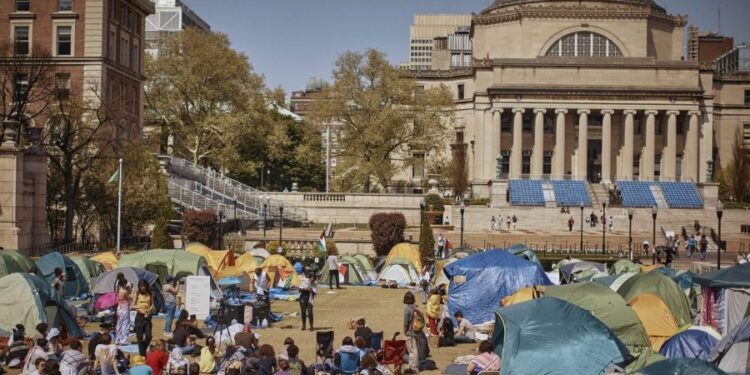
The countdown for universities to develop plans on how to deal with protests on campus has ended as students move back to campus after disputes over pro-Palestinian encampments caused chaos at the end of last academic year.
Numerous lawsuits are making their way through the legal system and Columbia University’s president recently resigned after a tumultuous ending to classes in May that led to more than 2,000 arrested on campus.
Experts are skeptical of how prepared schools are for another round, but believe the protests won’t reach the size or momentum they had before.
Adam Swart, founder and CEO of Crowds on Demand, an organization that helps causes with marketing and protest organization, said he thinks fading intensity and divides among protestors will make for a calmer fall semester.
“I think you’re going to see a divide between the pragmatists, who see a Harris presidency is probably the best way to overall advance the Palestinian cause” and more progressive wings of the party don’t “see any nuance” between Trump and Harris on the issue. “
“This group is going to protest continuously, and perhaps even using more hard-knuckled tactics because of their smaller numbers,” he added.
Multiple schools created new rules for protesting over the summer, particularly around encampments that lasted for weeks and blocked entrances to buildings at some colleges.
Administrators at Columbia University, where activists took over a campus building in April, banned campus encampments and limited protests to certain areas.
Indiana University banned protests after 11 p.m. and required all signs on campus to receive prior approval.
“I know nationally the Jewish community has been reaching out to university presidents and officials, both at the national level and the state and local level, because everybody has been concerned … if what happened in the spring was going to happen this fall semester,” Ron Halber, the executive director of the Jewish Community Relations Council of Greater Washington.
While schools have been gearing up for the new academic year, so have students who have shown they are ready to fight for their cause again.
“What we will see [is] the students will continue their activism, will continue doing what they’ve done in conventional and unconventional ways. So not only protests, not only encampments, kind of any — any available means necessary to push Columbia to divest from Israel,” Mahmoud Khalil, student negotiator on behalf of Columbia University Apartheid Divest, previously told The Hill.
And some are concerned schools will violate the free speech rights of the protesting students and aren’t prepared to engage with activists proactively.
“We don’t think that schools and colleges across the country are ready to deal with more protests,” said Amr Shabaik, the legal director for the Council on American-Islamic Relations.
“The bottom line is everyone wants students to be safe. They want students to feel included on their college campuses. But unfortunately, right now, the responses we’re seeing from colleges is cracking down on students,”
Shabaik said “some of these schools may be thinking they’re getting ready for the fall,” but “are not taking the steps that ensure that all of their students are protected. And they are potentially creating an environment where these students are going to be further marginalized and further subject to harassment and discrimination,” he added.
Some critics of the protests also expressed concerns that smaller numbers will lead to more aggressive action from demonstrators.
“I believe that, because the protestors will be smaller in number, I would caution colleges to be prepared for really aggressive tactics by some of them, because they’re not going to have the numbers they had before,” Swart said.
“I would anticipate that the smaller group is going to potentially engage in some very aggressive forms of demonstration, and law enforcement should be prepared for that.”
Pro-Palestinian protestors already vandalized a Columbia University’s official apartment building, releasing bugs in the lobby and splashing red paint on the premises.
The University of Michigan’s student government has been taken over by demonstrators, who are refusing to fund campus groups until demands of divestment are met.
“I think we’ll be very demanding that law enforcement actually charges and prosecute those who commit these offenses. There were too many students, students who were given a slap on the wrist for their outrageous behavior,” Halber said.
“And the only way to temper this is to have a zero tolerance policy for things that violate the law. No more encampments, no more. You know, you want to protest here, you have an hour and a half on the spot to go protest. We aren’t talking about restricting anybody’s right to freedom of speech, but what happened last year on too many university campuses was an absolute disaster. It was an absolute circus,” he added.







